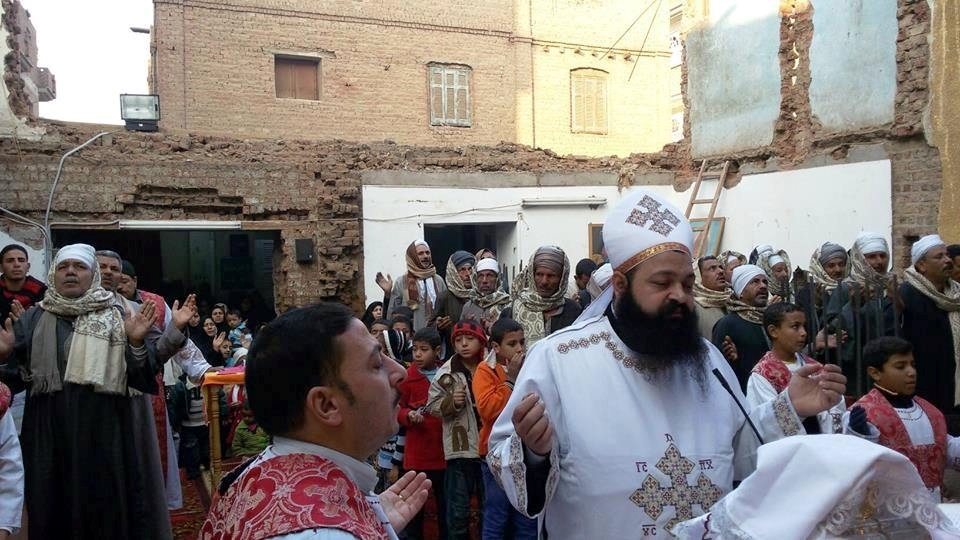Egypt’s ‘Security Threats’: Churches

The Christians of Nag Shenouda celebrated Easter 2015 in the street after local Muslims rioted and burned down their temporary worship tent, and attacked their religious service at a home.
Raymond Ibrahim – Gatestone Institute – 16/2/16
On February 1, Tharwat Bukhit, a Coptic Christian member of Egypt’s parliament, said that “there are approximately 50 churches in Egypt that are closed for reasons of security.” In 2011—when the “Arab Spring” began—the nation’s Christians had compiled a list of 43 churches that were shut down by local authorities over the years. This list was given to the then prime minister of Egypt, Dr. Essam Sharaf, who said the churches would be opened as soon as possible. Yet, according to the Coptic MP, “Today, the number of closed churches has grown to almost 50.”
Why are Christian churches being “closed for reasons of security”? Whenever Christians attempt to repair, renovate, or build a church—all of which contradict Islamic law[1]—the same events follow: local Muslims riot and rampage and local (Muslim) officials conclude that the only way to prevent “angry youth” from acts of violence is to ban the church, which is then seen and treated as a “threat” to security.
These sequences of events have occurred repeatedly throughout Egypt—most famously when Egyptian President Sisi agreed for a memorial church to be built in Al-Our village, where 13 of the 21 Christians who were beheaded by the Islamic State in Libya were from and where their families still live. In response, Muslim mobs from Al-Our village rose in violence after Islamic prayers on Friday, April 3, 2015. They yelled that they would never allow a church to be built, that “Egypt is Islamic!” Molotov cocktails and stones were thrown at another Coptic church, cars were set ablaze—including one belonging to a relative of one of the those Christians decapitated by the Islamic State—and several people were injured.
In Sohag City, a similar chain of events took place. After waiting 44 years, the Christians of Nag Shenouda were issued the necessary permits to build a church. According to a 2015 report, local Muslims rioted and burned down the temporary worship tent. When a Christian tried to hold a religious service in his home, a Muslim mob attacked it. Denied a place to worship, the Christians of Nag Shenouda celebrated Easter 2015 in the street.
In a separate incident, also after waiting years, the Christians of Gala’ village finally received formal approval to begin restoring their dilapidated church (see pictures here). Soon after, on April 4, 2015, Muslims rioted, hurling stones at Christian homes, businesses and persons. Christian-owned wheat farms were destroyed and their potato crops uprooted. The usual Islamic slogans were shouted: “Islamic! Islamic!” and “There is no God but Allah!”
In July 2015, Muslims suspended prayer in a church in the village of Arab Asnabt in Abu Qurqas, and called for demolishing it in an effort “to prevent Coptic Christians from practicing their religious rites.”
Most recently, on February 1, the same day when the Coptic Christian MP Tharwat Bukhit said nearly 50 churches had been closed, the priest of St. Rewis Church explainedhow on the first day Christians met to worship in a fellow Christian’s home which he had transformed into a church, “Muslims prevented them so that the church was closed on the very day it was opened.”
On February 2, Father Lucas Helmi, official of the Franciscan Order in Egypt, explainedhow “the closure of St. George’s Church in the village of Hijazah in Qous [closed 25 years ago] goes back to tensions between Coptic and Muslim families in the village, especially the Muslim neighbors around the old church, which is still unfinished because they refused to allow it to be rebuilt after it was demolished.”
Christian leaders accuse local officials of inciting—and then citing—Muslim violence against churches as reason to deny permits, apparently whenever local Muslims fail to take the initiative.
A few weeks ago, a church under construction in Swada village of Minya was attacked by a mob consisting of at least 400 Muslims believed to have been incited by local officials. After the attack, and although the church had obtained the necessary permits required for construction, it was closed by the same officials. Although comprising approximately 35% of Swada village, the 3,000 Coptic Christians there don’t have a single Coptic Orthodox Church to serve them.
In May, 2015, during a 25-minute interview on Arabic satellite TV, Bishop Agathon shed light on how authorities incite the mob. He explained[2] how after an official council meeting with government officials about the possibility of building a church, one of the authorities contacted the Islamic sheikhs of the village in question asking whether they “stand with the Coptic church or with the State?” Muslim households were instructed to send one family member to protest against the proposed building of a church—so that security could then point to the “rioting mob” and, as usual, on grounds of security, ban the church.
[1] According to the Conditions of Omar, a Medieval Muslim text that delineates the debilitations Christians must accept in order not to be killed by the Islamic state, Christians are commanded “Not to build a church in our city—nor a monastery, convent, or monk’s cell in the surrounding areas—and not to repair those that fall in ruins or are in Muslim quarters; Not to clang our cymbals except lightly and from the innermost recesses of our churches; Not to display a cross on them [churches], nor raise our voices during prayer or readings in our churches anywhere near Muslims…” See Crucified Again, pgs. 24-30.
[2] Bishop Agathon made many remarks accusing the Egyptian government of being behind the persecution of Christians in Egypt—including the rampant kidnapping of Christian children. A translation of his remarks can be read here.
